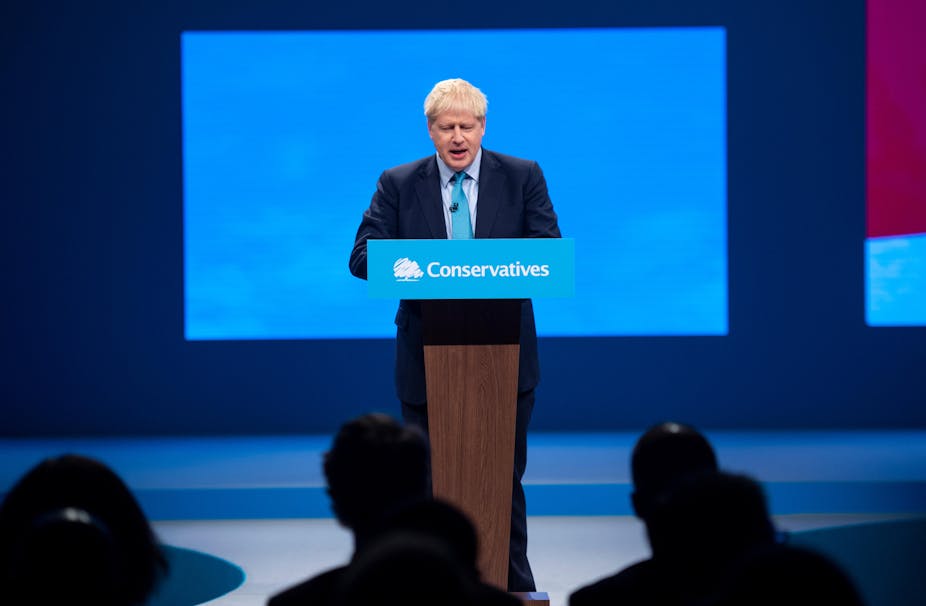The inquiry into discrimination in the Conservative party has published its report. Led by Professor Swaran Singh, a former commissioner of the Equality and Human Rights Commission (EHRC), the inquiry looked into complaints of discrimination made to the party between 2015 and 2020. The 44,000-word report details multiple troubling examples of Islamophobia but ultimately fails to acknowledge key incidents as such.
The catalyst for the Singh report came in 2018 when the Muslim Council of Britain called for an independent inquiry into Islamophobia in the party. The council had compiled a dossier detailing near-weekly incidents involving various party members and was supported in its call by, among others, Baroness Sayeeda Warsi, the former party co-chair. Boris Johnson’s comments about Muslim women who wear the full face veil as looking like “letterboxes” and “bank robbers” merely added fuel to the fire.
It was the unlikely figure of Sajid Javid a year later, however, who gave the call impetus. During a BBC Conservative leadership debate, the then Home Secretary asked his rivals: “Shall we agree, guys? Shall we have an external investigation into Islamophobia?”. All, including Johnson, agreed.
But by the time Johnson was installed as leader and prime minister, he had shifted the focus of the inquiry away from Islamophobia and onto all forms of discrimination. The impact was threefold. First, it distanced the Conservatives from the very reason why an inquiry was deemed necessary: claims of widespread Islamophobia. Second, the party was able to set the parameters of its own inquiry. Finally, by subsuming Islamophobia within a broader topic of interest, the party was not only able to avert an in-depth interrogation of the problem but so too any potentially damning findings.
Hundreds of complaints
Despite Johnsons’s shift, the report says that two-thirds of all discrimination complaints analysed were anti-Muslim. In total, the party’s central database recorded 1,418 complaints between 2015 and 2020. Of these, 727 incidents were of alleged discrimination – of which 496 related to Muslims and Islam. Approximately three quarters of these involved the use of social media.
Of the third of cases that resulted in a sanction, 50% culminated in suspension and 29% expulsion from the party.
The problem, however, is likely to be far bigger than the inquiry found given that it only focused on formal complaints. Doing so is likely to have failed to take into account the regular and routine forms of Islamophobia that take place in everyday life. We know that experiences of hate and discrimination are notoriously under-reported and that Warsi has claimed that Islamophobia is “widespread [in the party] … from the grassroots, all the way up to the top”.
Zac Goldsmith’s mayoral campaign
During the inquiry, Zac Goldsmith’s 2016 London mayoral campaign was investigated. Branded “disgusting” at the time, Goldsmith published a piece in the Mail on Sunday with the headline, “Are we really going to hand the world’s greatest city to a Labour Party that thinks terrorists are its friends?”. Alongside it was a photo of the 7/7 bombings.
Goldsmith went on to paint rival Sadiq Khan as a security risk, claiming he had links with extremists prior to becoming a member of parliament and continued to support Islamic State to the present day. According to the report, only one complaint had been made about Goldsmith’s campaign: it was subsequently dismissed as unsubstantiated.

From speaking to Goldsmith, the report claimed he now “accepts poor judgment in the way his campaign was conducted”. It added that Goldsmith “forcefully denies harbouring anti-Muslim sentiments or using such sentiments for political advantage”. Accordingly, Goldsmith has nothing to be accountable for.
Without wanting to resort to petty “whataboutery”, it is unlikely that “poor judgment” and a “forceful denial” would suffice – and rightly so – as regards other discriminatory phenomena. While there should be no hierarchy of hate or discrimination, again it would seem that Islamophobia does not demand the same level of scrutiny and criticality as other similar phenomena do.
Boris Johnson’s comments
The inquiry also investigated Johnson’s comments about veiled Muslim women. Splitting opinion, the report claimed those who found Johnson’s language to be offensive and in breach of the party’s code of conduct were a minority. During the inquiry, Johnson said:
I do know that offence has been taken at things I’ve said, that people expect a person in my position to get things right, but in journalism you need to use language freely. I am obviously sorry for any offence taken.
Overlooking the fact that Johnson’s comments caused a spike in verbal abuse directed at Muslim women – maybe due to no formal complaints being made – the inquiry weakly chastised the prime minister. Describing his words as “insensitive”, the inquiry reminded him of the need for “measured and appropriate language”. If “insensitive” is now a synonym for “Islamophobic”, then the inquiry was right.
Islamophobia and ambivalence
In some ways, the Singh report is similar to that of the Commission on Race and Ethnic Disparities published in April. While that report claimed no evidence of “institutional racism” in contemporary Britain, the Singh report failed to contemplate even the merest suggestion the Conservative Party was “institutionally Islamophobic”. Given the number of complaints and the senior figures implicated, it was a question that justified being asked. Failing to do so has undoubtedly left the inquiry open to criticism.
Accusations of whitewashing are far from surprising. Islamophobia is politically ambivalent: it can be routinely deployed by political actors for political and personal gain, knowing there will be no recourse or censure whatsoever due to it not being a “vote winner”. In essence, few care.
That same message seems to underlie the Singh report: Islamophobia in the Conservative Party is a problem – but so what? Until it is attributed with the importance it demands and on an equal footing with other discriminatory phenomena, insensitivity and poor judgment will continue to be excuses for being Islamophobic.

